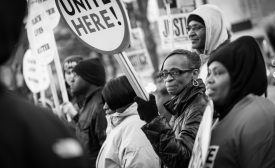music diplomacy
The song playing was Taylor Swift’s ode to young adulthood, which is something of an anthem for American millennials. The lyrics transform an unexciting age into an identity, the uncertainty of youth into a celebration. [...] The song set the tone for that night and cemented what became a steadfast friendship among us, students from different continents with traits more different than similar.

Artists from Busta Rhymes to Residente are taking inspiration from the musical phenomenon to continue a global conversation on what America represents.
Tang said mariachi music transcends borders and cultures because of the universal feelings of love and loss that this music reflects. She’s planning a trip to China as part of a cultural exchange program and hopes her love of this musical form will entertain Chinese audiences.
One of the rising voices in West Coast Rap, Raja Kumari puts her Indian-American identity front and center.

Sounds of rage and sorrow on social media.
A group of Polish musicians and artists has held an exhibition in Beijing as part of a cultural exchange. The tour is part of a national-level initiative between China and Poland, that stretches from 2016 to 2019. The group will visit 6 cities in China.
The students began to loudly beat the circle drum in front of them, performing a traditional Blackfeet song. Their demonstration was part of a cultural exchange between the Native tribes and their Japanese visitors from the Kenny Endo Contemporary Ensemble.







